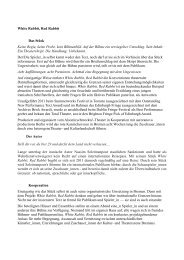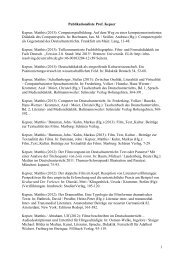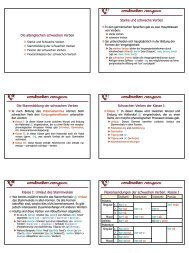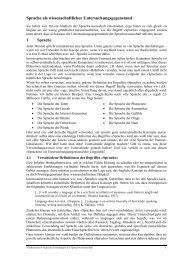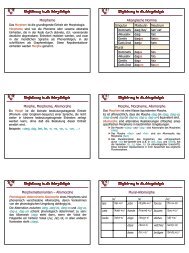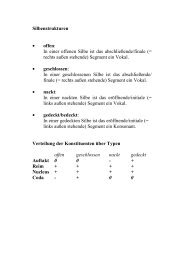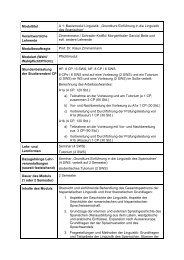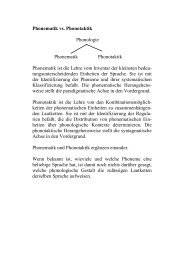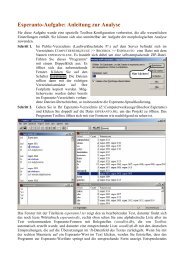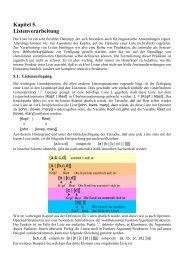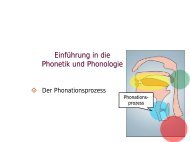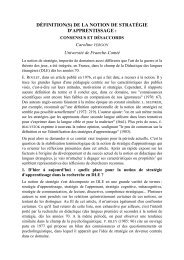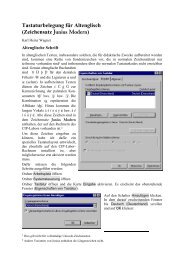Relativism and Universalism in Linguistics - Fachbereich 10 ...
Relativism and Universalism in Linguistics - Fachbereich 10 ...
Relativism and Universalism in Linguistics - Fachbereich 10 ...
You also want an ePaper? Increase the reach of your titles
YUMPU automatically turns print PDFs into web optimized ePapers that Google loves.
Friday, September 1, 2006<br />
Section K: Theory - Methodology<br />
Conference room: GW1 HS <strong>10</strong><strong>10</strong><br />
14:00–14:30 Beedham, Christopher (University of St. Andrews)<br />
Us<strong>in</strong>g exceptions to rules as a means of empirical research <strong>in</strong> grammar<br />
14:30–15:00 De Cuypere, Ludovic (University of Gent) / Willems, Klaas (University of<br />
Gent) / van der Auwera, Johan (University of Antwerp)<br />
Iconicity <strong>in</strong> language: an <strong>in</strong>tegrated approach<br />
15:00–15:30 Huszár. Ágnes (Universität Pécs, Ungarn)<br />
Versprecheranalyse im Dienste sprachtypologischer Überlegungen<br />
15:30–16:00 Stroh-Woll<strong>in</strong>, Ulla (Uppsala University, Sweden)<br />
The concept of def<strong>in</strong>iteness<br />
16:00–16:30 Seuren, Pieter A.M. (Max Planck Institute for Psychol<strong>in</strong>guistics,<br />
Nijmegen)<br />
L<strong>in</strong>guistic evidence for speech act operators<br />
Us<strong>in</strong>g exceptions to rules as a means of empirical research<br />
<strong>in</strong> grammar<br />
Beedham, Christopher<br />
University of St. Andrews<br />
C.Beedham@st-<strong>and</strong>rews.ac.uk<br />
Given that the number of sentences <strong>in</strong> a language is <strong>in</strong>f<strong>in</strong>ite, how do you go about tackl<strong>in</strong>g<br />
<strong>in</strong>f<strong>in</strong>ity? In this paper it is suggested that unexpla<strong>in</strong>ed lexical exceptions to rules present us<br />
with the opportunity to empirically <strong>in</strong>vestigate those rules, to f<strong>in</strong>d out why a rule is wrong <strong>in</strong><br />
that it produces mysterious exceptions, <strong>and</strong> to revise the rule so that it does not lead to those<br />
exceptions. Two examples are given, the rule of passive formation, <strong>and</strong> the rule of tense<br />
formation, <strong>in</strong> English, German <strong>and</strong> Russian. The exceptions to the rule of passive formation<br />
are non-passivizable transitive verbs, e.g. English to have, German mögen ‘to like’. An<br />
empirical <strong>in</strong>vestigation of exhaustive lists of such verbs <strong>in</strong> those two languages led to the<br />
discovery that most of them also do not form a resultative perfect, which <strong>in</strong> turn led to the<br />
conclusion that the passive is an aspect of the type Auxiliary + Participle (like the perfect),<br />
mean<strong>in</strong>g ‘action + state’, whereby only telic verbs – verbs with an <strong>in</strong>herent end-po<strong>in</strong>t <strong>in</strong> their<br />
semantics (capable of becom<strong>in</strong>g the end-state of the mean<strong>in</strong>g ‘action + state’) – can form a<br />
passive. Thus the explanation for non-passivizable transitive verbs is that they are atelic, <strong>and</strong><br />
hence cannot form a passive. Although this analysis arose <strong>in</strong> theoretical l<strong>in</strong>guistics it is readily<br />
applicable <strong>in</strong> pedagogical grammars of English, German, <strong>and</strong> Russian.<br />
The exceptions to the rule of tense formation are strong or irregular verbs <strong>in</strong> English <strong>and</strong><br />
German, <strong>and</strong> non-productive verbs <strong>in</strong> Russian. Most verbs form a regular preterit <strong>and</strong> 2 nd<br />
participle with –ed –ed <strong>in</strong> English <strong>and</strong> with -t- -t <strong>in</strong> German, but approx. 150 verbs <strong>in</strong> each of



